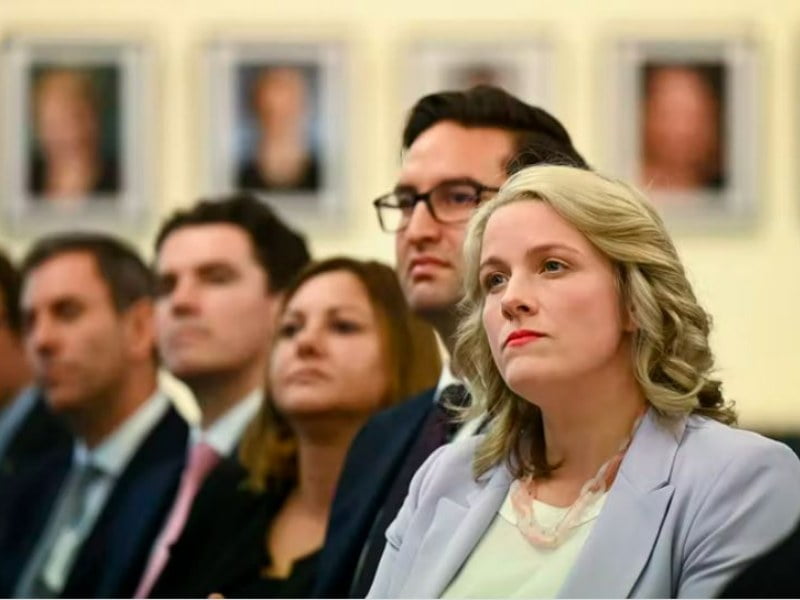Home Affairs minister Clare O’Neil’s decision to pull digital passenger cards has raised new questions about the underlying government technology platform and its chequered history as the development bill continues to climb.
Combined with its abandoned predecessor, the expected cost of the platform is approaching $250 million. A week ago, its first deployment was shelved after just five months and shocking reviews from travelers.
The Digital Passenger Declaration is a smartphone app that collects contact information, vaccination status, passport information and travel history from people arriving in Australia by air. Its use was stopped as part of easing COVID-19 entry requirements, but the new Home Affairs minister acknowledged the app “needs a lot more work” after scathing reviews from users.
The decision was welcome news to travelers but will provide fresh ammunition to critics of the way the underlying technology has been developed.

The Digital Passenger Declaration was the first test of a reusable “permissions capability” being developed by Home Affairs and the Digital Transformation Agency, which had outsourced much of the work to multinational tech firm Accenture.
The permissions capability marked what the previous government said was a new approach to technology procurement and followed an abandoned visa processing platform that had become mired in controversy.
The capability has first been used for the Digital Passenger Declaration, and will then be tailored for visa processing. It has been developed with reuse across government for many permissions-based services in mind, such as permits, accreditations, licences and registrations.
The previous Coalition government had announced the move to a permissions capability in October 2020, six months after it abandoned its visa processing predecessor, the so-called Global Digital Platform.
Chequered past
Home Affairs had wanted the Global Digital Platform to modernise its visa processing, to match migrants to employment opportunities, help identify national security threats, and generally improve its own decision processes ahead of a forecast growth in visa services.
But the move, expected to cost $1 billion, was widely criticised as a privatisation of visa processing, which a similar UK example suggested would lead to higher costs for applicants and longer wait times.
The government and Home Affairs rejected the claim that Global Digital Platform was a privatisation and pushed ahead with the plan, insisting that even though the technology would be outsourced, the Commonwealth would always retain control of visa decision-making.
Home Affairs began searching for providers with a call out to market in 2017, attracting more than a dozen respondents. These companies worked with the department to refine its requirements.
The tender was then limited to just two bidders; consortiums led in technology by Oracle and Accenture. This tender process was criticised as opaque and effectively locking out small and medium enterprises from working on the Global Digital Platform.
A Senate committee inquiry examined the project and its tender process in 2019. The Labor- and Greens-led committee eventual found that the Global Digital Platform was indeed an effectively privatisation of visa processing being conducted through an “opaque” tender process. It recommended ditching the tender process and developing an in-house solution.
Coalition senators on the committee again rejected the criticism, but the Global Digital Platform was scrapped within weeks. But not before it had cost taxpayers as much as $92 million.
Nearly $65 million of the money spent went to outside contractors, with the rest had been allocated internally through the department.
Of the contractors, the Boston Consulting Group received most of the spending, netting $43.5 million for its work helping with the abandoned plan, or more than $8 million a year.
The Accenture and Oracle consortiums shortlisted to deliver the Global Digital Platform also reportedly received $1 million each.
All of this money was spent before a final provider had even been selected, let alone work starting on the actual Global Digital Platform. 18 months later, Accenture was given the lead on the replacement permissions capability project.
Permissions contrition
The 2020-21 budget allocated $74.9 million for the project. Further funding was allocated to the permissions capability in last year’s MYEFO but was kept secret due to “commercial in confidence sensitivities”.
The Irish-domiciled tech giant was selected in September 2021 to deliver the new platform at an expected initial cost of more than $58 million, split over several contracts.
Amendments to the contracts have seen this cost grow past $61 million, and it has since been revealed these contracts do not cover the government’s planned expansion to a visa use case.
Another $6.4 million has been given to Canberra consultancy Synergy to set up a permissions capability program management office.
Other consulting companies have already been paid another $13 million to provide advice on the initial phase of the permissions capability project, with Pragma Partners landing $6.5 million and KPMG getting $2.98 million, among others.
The national audit office is currently examining whether the permissions capability procurement process employed “open and effective competition and achieved value for money”, in line with government procurement rules.
So far, the money has produced a Digital Passenger Declaration found to routinely not work and which Ms O’Neil has acknowledged is contributing to delays at Australian airports already under strain.
“We’ve … listened to feedback about the [Digital Passenger Declaration],” Ms O’Neil said. “While in time it will replace the paper based incoming passenger card, it needs a lot more work to make it user friendly.”
Much more work will be needed to fulfil the bigger plan for the permissions capability.
Do you know more? Contact James Riley via Email.

